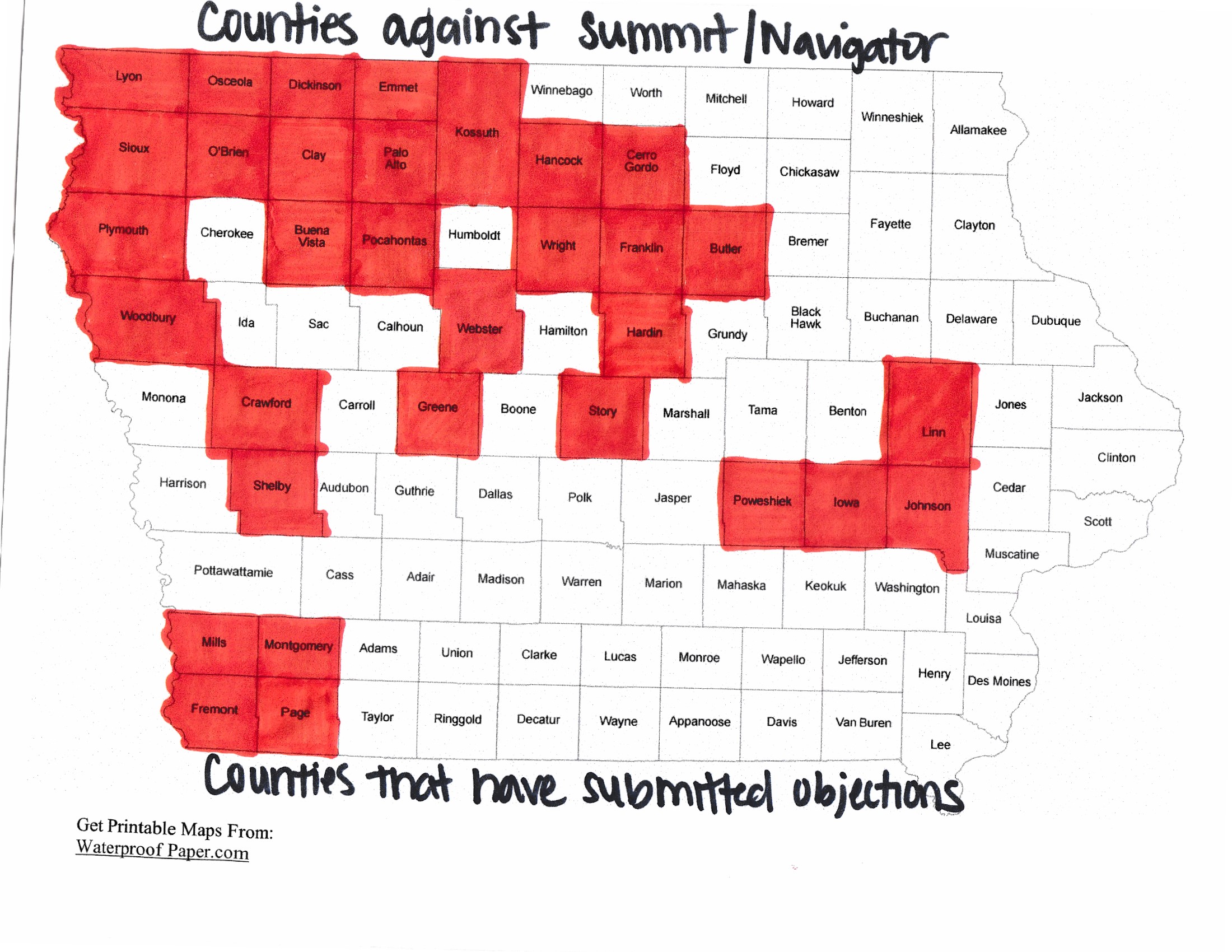It is primary election season in Iowa. The primary selects the people who will be competing for each political party in the general election in November. Starting May 18 through June 6, voters can cast their ballots in-person voting at the county auditor's office or at satellite voting stations. If you want a paper ballot sent to you for absentee voting, your request for an absentee ballot must be received by close-of-business on May 23. Or you, you can always vote at the polls on election day, June 7. Elections can have huge consequences on environmental issues.
In the meantime, the legislature is still in session. The Senate still has not undertaken steps to approve any of the appropriations bills that will finance state government for the next fiscal year.![]()
Take care,
Pam Mackey Taylor, Chapter Director and Newsletter Editor
Photo, Pinicon Ridge Park, Central City, Iowa
What you can do to help the environment
- Ask Governor Reynolds to sign the bill for radon testing in public schools and to undertake remediation if high levels of radon are detected - HF2412.
- Vote in the primaries
- If you live in a county where the proposed carbon pipelines will be routed, ask your Board of Supervisors to submit an objection to the pipelines to the Iowa Utilities Board
- Donate to the Iowa Chapter of the Sierra Club so that we can continue this work.
In this issue of the Iowa Sierran
Primary election information
-
Primaries are June 7; are you registered to vote?
Carbon Dioxide Pipelines
Water Quality and Agriculture
News from the Legislature
Events
-
Join us for interesting and informative webinars and Lunch and Learns
Plus
-
Contribute to the Iowa Chapter
-
Volunteer for the Iowa Chapter
-
Calendar of events
-
To see the archive of previous Iowa Chapter newsletters
-
To see the White Pine Needle newsletter
Primaries are June 7; are you registered to vote?
To vote in Iowa, you must be registered to vote. Check the secretary of state's website for the voter registration form.
- You must be a US citizen.

- You must reside in Iowa.
- If you are 17 years old, you can vote in a primary election if you will be 18 on or before the day of the regular election. For all other elections, you must be 18 years old on or before election day.
- If you have been convicted of a felony, you cannot vote unless your voting rights have been restored. Check the secretary of state's webpage for instructions.
- If you have been judged mentally incompetent to vote by a court, you will not be allowed to vote.
- You cannot claim the right to vote in any other state.
Have you moved since you last voted? If so, you will need to re-register to vote.
Are you not sure if you are registered to vote? You can check the voter database to see if you are registered.
If you missed voting in the last few elections, you should check the voter database to see if you are registered.
If you have changed your name since you last voted, you need to re-register to vote.
You can register to vote at the polls. You will need to show identification and proof that you are living at the residence. Alternatively, a registered voter who lives in your precinct and who knows you and knows where you live can sign an oath confirming your identity and residency.
If you have questions about voting in the primaries or the general election, contact your county auditor.
Vote with an absentee ballot for June 7 Primary
Absentee balloting begins on May 18. You have several options:
- vote in person at the county auditor's office from May 18 until June 6.
- vote at a satellite voting station May 18 to June 6. Note this election, you might find that there are significantly fewer satellite voting stations than in previous years.
- vote with an absentee ballot, which you return to the auditor via the US postal service, in a drop box, or in person to the auditor's office prior to the close of the polls on June 7. Military members or people living out of the country have until noon on June 13 to deliver their ballots. Also participants in the Safe at Home domestic abuse program have until noon on June 13 to deliver their ballots to the county auditor's office. With recent changes in the post office schedules, you will want to mail your ballot early so that it arrives at the auditor's office on time. You can still request that an absentee ballot be mailed to you, if your request is received at the auditor's office by close of business on May 23.
- vote in person on June 7
Voting in person at the auditor's office or a satellite voting station are good options. That way you do not have to worry about delays in getting your ballot to the auditor's office. Further, you can avoid issues that restrict your ability to get to polls on election day - any emergency, health issue, or problem in getting away from work.
The rules for voting have changed significantly in the last few years. Among the many changes you will see are fewer satellite voting stations than in previous years; some counties will have no drop boxes where you can deposit your ballot; there will be a reduced number of days for absentee voting; and the polls will now close at 8pm.
Further, you can be charged with criminal penalties for delivering other voters' absentee ballots even if you have been asked to do so, if you have not completely followed the new laws in this area. Only the voter, an immediate family member, household member, or caregiver can return the ballot to the auditor's office or put it in the mail. Someone who is blind or disabled can designate a person to deliver their ballot, but it must be accompanied by paperwork, with limits on who can be designated to deliver the ballots, and with the restriction that a person can deliver only two ballots to the auditor's office. Check with your county auditor for details on the rules and the paperwork that needs to be signed.
The Sierra Club's work rests on the actions by legislators and the governor. The legislator's votes on bills can help or destroy the environment. The governor signs or vetoes those bills, names staff for departments that enforce the environmental laws, and names members to boards and commissions that concern our work (such as the Environmental Protection Commission, Natural Resources Commission, Iowa Utilities Board). Their actions affect all of the things we care about - clean water, healthy air, soil health, parks and recreation, climate change, pipelines, and good governance.
Legislation waiting for the governor's review
A number of pieces of legislation have moved to the governor's office. The governor can sign the bills or veto them. Here is what we are following:
HF2412 - radon testing in public schools. The Iowa legislature passed a bill that would require testing for radon in public schools every 5 years. If the radon levels are high, the school would need to undertake radon abatement steps. Indoor radon is the leading cause of environmental lung cancer in Iowa. Radon gas is released when uranium breaks down. Uranium is a natural chemical found in Iowa’s soils and rocks. Outdoor levels of radon are low. However, radon levels can build up inside a building. Radon is an odorless, tasteless, and colorless gas. The only way you know if you have high levels of radon is to test for it. Given the high levels of radon found within the state, it only makes sense to have a program of testing schools for radon levels and then initiating methods to reduce radon levels if they are high. Furthermore, it makes sense to repeat the tests every 5 years, just to make sure that radon levels remain safe. Building radon abatement systems in new school buildings also makes sense. Ask the governor to sign HF2412 via her E-Mail. Note: To electronically send a letter to the governor, you must use the governor's E-Mail system on her website. Or phone her office at 515-281-5211.
Update on bills signed by the Governor
The governor signed SF2322 - reasonable costs for public records. SF2322 would curb the excessive fees members of the public have been forced to pay for those records. In fact, members of the public, the media, and the Sierra Club have had to abandon requests when the quoted fees have been too large. This legislation also limits charging for legal services for the redaction or review of public records. Currently the fees for redaction and review can been so excessive that private citizens cannot afford to view public records; that is not right. The cost for copying the records should be reasonable, not excessive and not at a profit to the agency. The Sierra Club supported SF2322.
Update on Carbon Dioxide Pipelines
Majority Of Counties On The Carbon Pipeline Routes Object
Since the Summit, Navigator and ADM/Wolf carbon dioxide pipeline projects were announced in late 2021, Iowans have united to stop the projects from being approved by the Iowa Utilities Board (IUB).
One of the strategies we’ve been focusing on is getting County Governments to voice their opposition to the projects and join the coalition of farmers, landowners, Indigenous People, and environmentalists. And we’ve done a great job! As of Friday, May 13, 32 of the 52 impacted counties have either objected to the use of eminent domain or the pipeline projects all together or have intervened on behalf of the county.
County Supervisors have great concerns about the pipeline and the damage it will cause to the landowners. They expressed these concerns in their filings with the Utilities Board. Further they openly oppose the use of eminent domain to acquire easements for the pipeline routes.
Opposition by the numbers:
- 32 out of 52 total impacted counties have objected with the IUB
- 23 of the 30 (77%) counties impacted by Summit have objected with the IUB
- 17 of the 36 (47%) counties impacted by Navigator have objected with the IUB
- Nearly 1000 landowners have submitted objections with the IUB
- 2,500+ (80%): the number of parcels that have not signed voluntary easements with Summit
Note: ADM/Wolf has not officially filed anything with the Iowa Utilities Board, so the numbers above may not include landowners affected by that pipeline.
County supervisors have a direct responsibility for protecting the land from the pipeline, which is part of the responsibility granted to them by the Iowa Utilities Board. Further they have a duty to protect their constituents. Some of their responsibilities include designating a county inspector, reporting, document gathering, notice of violation process, completion reporting, request for damages, and more. This amount of work, along with the increased staff time spent throughout the process places a big burden on counties already struggling to make ends meet.
Get involved!
Take a look at the list of counties below that have not passed objections. If your county is on the list, please contact your County Supervisors and ask them to pass an objection.
Counties that still need to pass and submit an objection to the Iowa Utilities Board: Benton ; Des Moines ; Mahaska ; Boone ; Hamilton ; Polk ; Cedar ; Ida ; Pottawattamie ; Cherokee ; Jasper ; Scott ; Chickasaw ; Jefferson ; Van Buren ; Clinton ; Keokuk ; Wapello ; Delaware ; Lee.
Let us know what you hear by emailing jessica.mazour@sierraclub.org.
Here is what some of the counties have put in their objections:
“The Woodbury County Board of Supervisors has heard from many landowners living in or owning land in Woodbury County that could potentially be affected by the two proposed private pipeline companies, and it has been unanimous from the landowners that each and every one of them is adamant that they do not want any pipelines encroaching on or through their property”, wrote the Woodbury County Supervisors.
“Here, the use of eminent domain to force private landowners in Greene County to provide easements for the construction and operation of the proposed hazardous liquid pipeline would transfer property rights from one private landowner to another without creating a “public use” within the meaning of the Fifth Amendment or article I, section 18 of the Iowa Constitution”, wrote John Muir, Chair of the Greene County Supervisors.
“While we note the many concerns expressed by our citizens regarding the safety of these pipelines, our opposition to these projects rests primarily with the fact that projects of this nature are not public utilities and should not receive eminent domain status. Unlike natural gas pipelines, fuel pipelines, and electrical transmission lines, CO2 pipelines serve no public purpose or utility. CO2 pipelines do not serve our people, our communities, or our overall economy. Based on the overall comments from constituents, we respectfully ask that you refrain from utilizing eminent domain in your pursuits”, wrote Jerry Muilenburg, Chairman of the Sioux County Supervisors.
The list of counties that have submitted or passed objections or interventions follows. Note: click each county to read their objection.
Buena Vista , Butler , Cerro Gordo , Clay , Crawford , Dickinson , Emmet , Franklin , Fremont , Greene , Hancock , Hardin - intervened in the Utilities Board case on behalf of the county , Kossuth , Iowa , Linn , Lyon , Montgomery , O’Brien , Osceola , Page , Palo Alto , Plymouth , Pocahontas , Poweshiek , Shelby , Sioux , Story , Webster , Woodbury , Wright
Plus Johnson - passed but not yet filed with the IUB , Mills - passed but not filed with the IUB

Update on Supreme Beef
The case against Supreme Beef has entered a new phase. We will now be conducting what lawyers call discovery. What this means is that we will be asking employees of the Iowa Department of Natural Resources (DNR), under oath, many questions about why and how they approved Supreme Beef’s nutrient management plan, even though it does not comply with DNR regulations or the facts.
A nutrient management plan is supposed to show that the handling and disposal of manure from the Supreme Beef operation will not cause pollution. So the amount of manure produced must be correctly calculated and the amount of manure applied to crop fields must not be in excess of the nutrients that the crops need.
Sierra Club and others submitted many comments objecting to the nutrient management plan for Supreme Beef. These comments showed in detail how the calculations in the nutrient management plan were incorrect and would allow too much manure to be applied to the crop fields, thus running off to and polluting Bloody Run Creek and other streams in the area.
The DNR did not provide adequate responses to our comments, so we need to question the DNR employees and get complete responses. That discovery process is expected to be completed by fall.
Digging into Outstanding Iowa Waters and Supreme Beef
One of the reasons the Supreme Beef case is so important and has implications for the future of Iowa’s water quality is that Bloody Run Creek, the stream at risk of pollution from Supreme Beef, is designated as an Outstanding Iowa Water (OIW).
What is an Outstanding Iowa Water?
An Outstanding Iowa Water is one that maintains a high level of water quality. It is a special designation, which restricts those activities that would put the water quality at risk – such as discharges from industries and agriculture.
At present, there are only 31 streams and 2 lakes on Iowa’s OIW list. The streams are all in northeast Iowa and the two lakes are West Okoboji and Spirit Lake.
The OIW designation comes from the federal Clean Water Act’s antidegradation policy. This policy is designed to maintain and protect high quality waters and existing water quality in other waters from unnecessary pollution.
How is Supreme Beef’s permit affected by an Outstanding Iowa Water?
The owners of Supreme Beef asked the Department of Natural Resources (DNR) for a permit that would allow them to spread the manure from their 11,600 beef cattle on farmland in the Bloody Run Creek Watershed. Because of the special protection given to an Outstanding Iowa Water, the Department of Natural Resources is expected to give any application for a permit an antidegradation review called a Tier 2.5 Review. This review ensures that the permittee’s discharges would not reduce water quality.
Unfortunately, even though Bloody Run Creek is an Outstanding Iowa Water, the DNR, in reviewing the Supreme Beef operation, did not conduct an antidegradation review using the Tier 2.5 procedure. This is one of the issues that Sierra Club is challenging in its lawsuit concerning the Supreme Beef’s NPDES permit.
Join us for interesting and informative webinars
Lunch and Learns
Every Friday at noon, we do a Lunch and Learn livestream. See us on Facebook at "Sierra Club Iowa Chapter". These will be recorded so you can watch them anytime. Topics will be selected based on what is happening during the week and will be announced the day before the livestream. During the legislative session, we cover issues coming before the Iowa legislature.
In case you missed our past webinars and lunch and learn sessions, you can still see them.
Volunteer for the Iowa Chapter
Almost everything we do is done by volunteers like you. If you would like to volunteer for the Iowa Chapter, please let us know by sending an E-mail to Iowa.chapter@sierraclub.org. Or sign up by using the online form. There are many opportunities for you to make a difference:
-
making phone calls
-
developing graphics for banners and flyers
-
working on legislative issues
-
working on elections
-
fundraising
-
organizing events
-
joining an issue committee
If you would like to join a committee on the Peoples Budget, sign up here please fill out our People's Budget Volunteer Form so we can build our organizing team for this project. A large number of Sierra Club issues require some involvement with Iowa's state budget. Budgets reflect theories of government. Iowa’s political conversation rarely moves beyond the notion that government’s primary responsibility is to grow the economy. Hence we give corporations tax breaks, but slash funding for health care, environmental protections and public interest research at our three state universities. We hold a different view of government and that is government is the trustee of all the things we share - public roads and bridges, water, wildlife, air, public universities, state parks, education and public health. Therefore, protecting, enhancing and restoring our shared public wealth is the central responsibility of government. We must tie the budget to our priorities.
If you would like to join our legislative action team, sign up here. Keep on top of what is happening at the Iowa legislature. Be alerted when you should contact your legislators about pending legislation.
Contribute to the Iowa Chapter
Sierra Club - the best bet for achieving bold solutions to Iowa’s environmental problems
Sierra Club is Iowa’s oldest and largest grassroots environmental organization. Not only that, we are the best bet in the state for achieving bold solutions to Iowa’s environmental problems.
We work in the courts, before Iowa’s public agencies, and in the halls of the legislature. The Iowa Chapter's effort to protect the environment takes financial support. The Chapter receives very little financial support from the national Sierra Club. Can we count on you for a donation to ensure even more victories? Your contribution will be put to work here in Iowa on issues that affect every day Iowans – water quality, clean air, protection of Iowa's soil, parks and natural areas, and a strong democracy. The Iowa Chapter is relentless in fighting back bad legislation that affects every one of us.
Your non-deductible contributions make it possible for us to fight bad legislation and to promote good legislation. We appreciate your past and on-going support of these efforts. You can make a non-deductible donation with a credit card. A non-deductible donation supports the Chapter's effective, citizen-based advocacy and lobbying programs. If you prefer, a non-deductible check can be written to the Sierra Club Iowa Chapter and mailed to:
Treasurer
Sierra Club, Iowa Chapter
PO Box 1058
Marion, IA 52302
You can also make a tax-deductible donation with a credit card. Tax-deductible activities are limited to public interest education, research and legal actions. A deductible check can be written to the Sierra Club Foundation with “Iowa Chapter” written in the memo line.
Thank you for your support.
Donate your used vehicle
As the Sierra Club Foundation's Iowa Chapter continues to raise charitable funds to support its work in Iowa, won’t you consider participating in our vehicle donation program? Our partners over at CARS have made the process of donating your unused or unneeded car, truck, motorcycle, boat or RV easy, efficient and secure. They’ll take care of everything from picking up your vehicle to sending you a tax receipt for your generous gift. To learn more about The Sierra Club Foundation's Iowa Chapter vehicle donation program, please call 844-674-3772. Or visit our webpage to get started today!
Sierra Club Foundation promotes climate solutions, conservation, and movement building through a powerful combination of strategic philanthropy and grassroots advocacy. The Foundation is the fiscal sponsor of Sierra Club’s charitable environmental programs.
For more information
Planned giving . . . naming the Sierra Club Iowa Chapter in your will
Ensure your environmental legacy by naming the Iowa Chapter in your will or trust. These gifts cost you nothing now. You can hold onto your assets for as long as you need them.

Thank you for supporting our work!
| When | Earliest: Latest: |
| What |
|
| Word or Phrase | Word or phrase to search for: |
| Leader | All or part of leader name to search for: |
No Matching Activities Found
Loading
| Date | Activity (click title for full description) | Sponsor | Category | Type | Difficulty | Links |
|---|
Loading ...
 Outing
Outing Club support event
Club support event  Social event
Social event  Activist event
Activist event  Multiple events (map only)
Multiple events (map only)